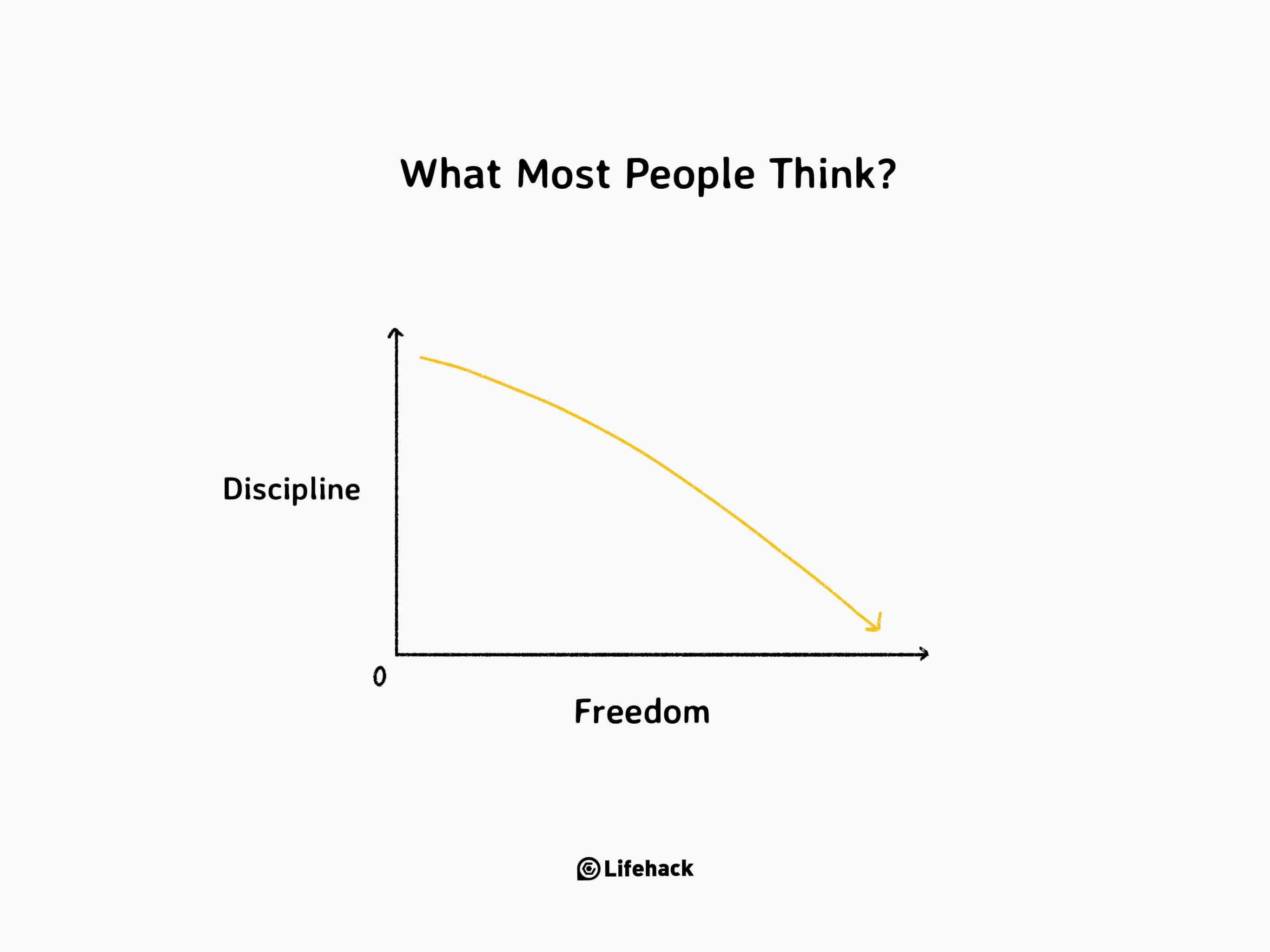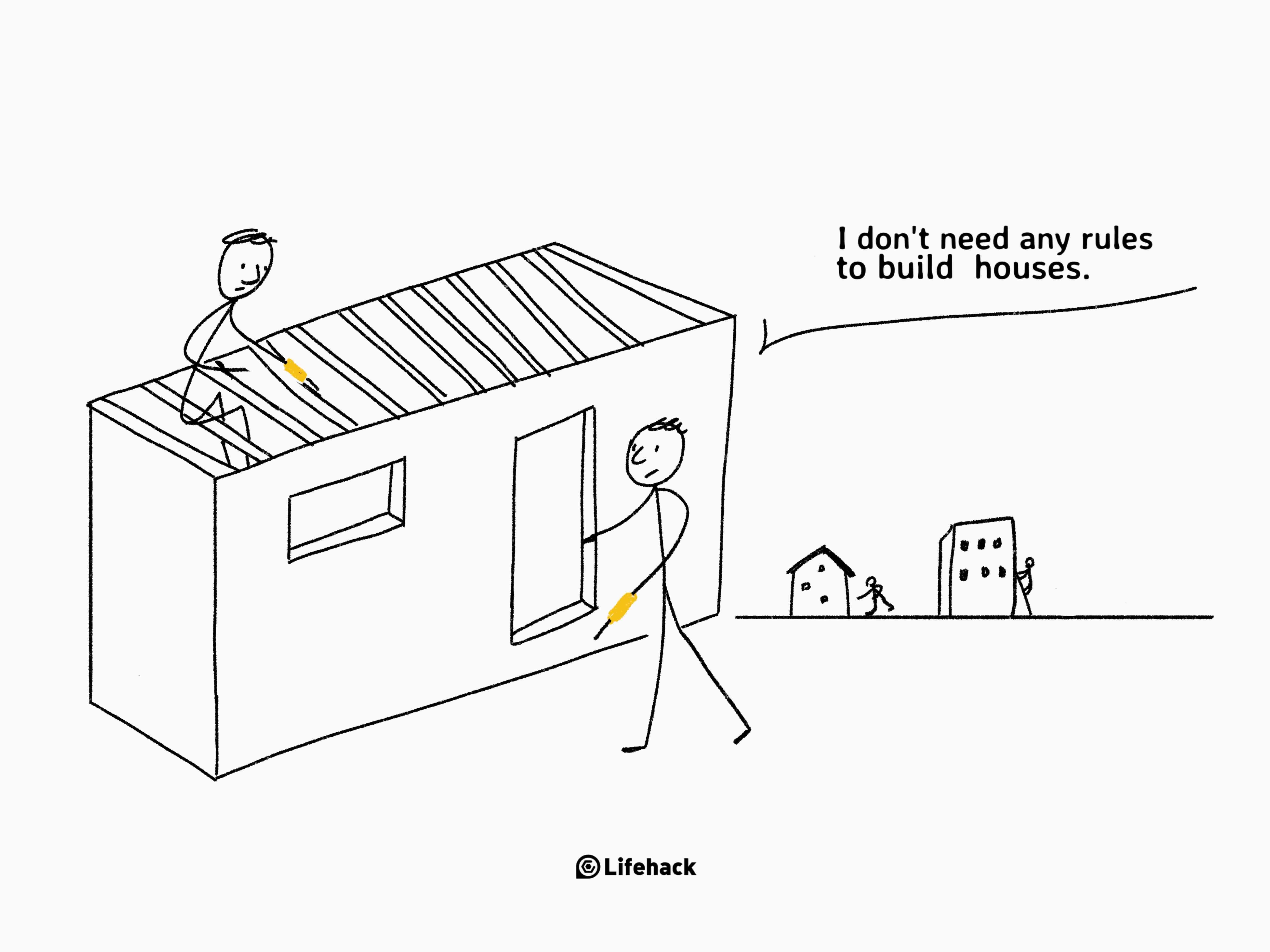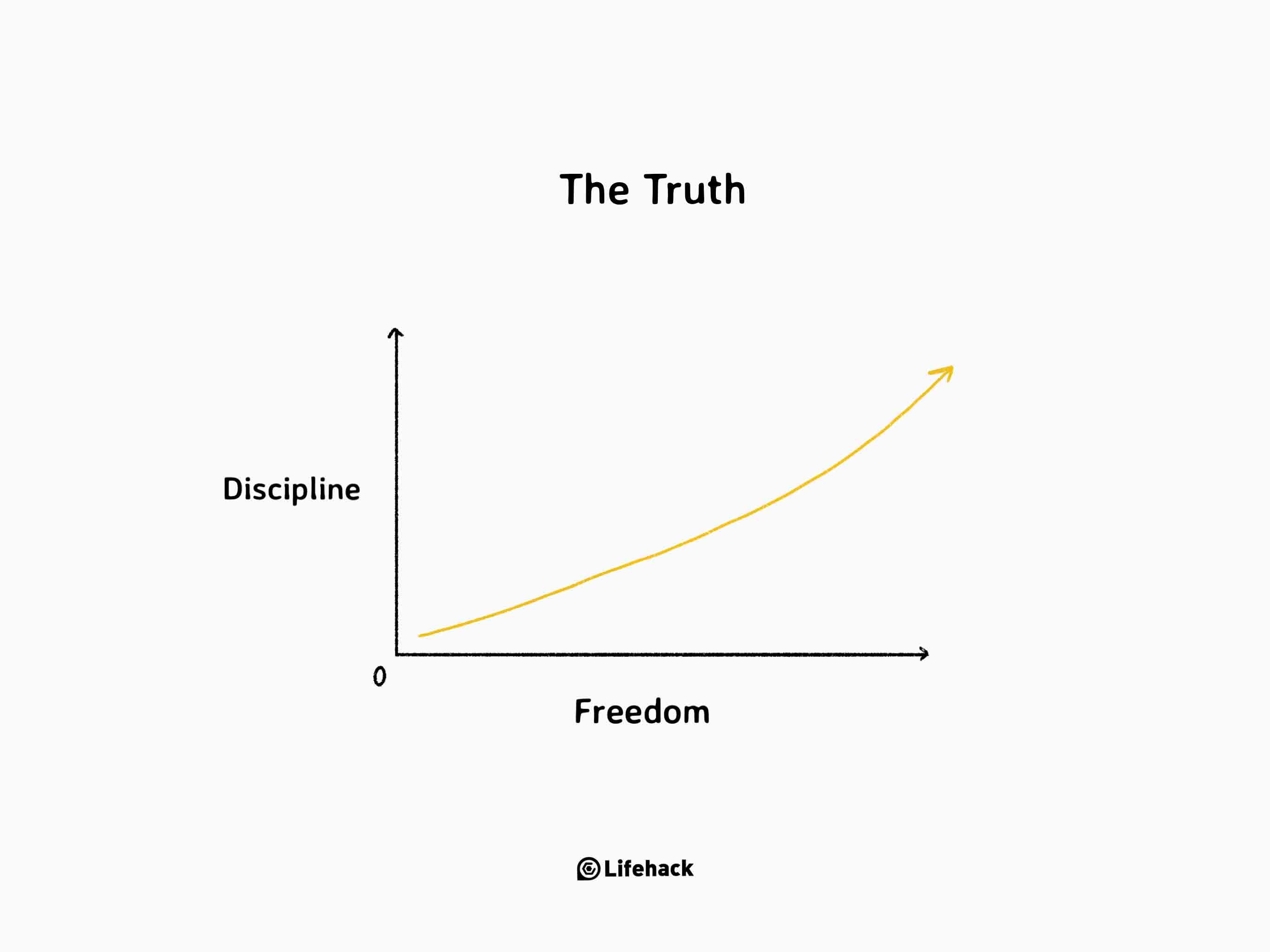Most of us think that more discipline relates to less freedom. The common line of thought is that discipline equals structure, which removes freedom.
This is what most of us think about the relationship between discipline and freedom:
We assume that there is a correlation between the two ideas. More discipline results in less freedom.
There is some logic to this thinking, but it’s false logic. If we were building houses, for example, freedom without discipline would offer some unusual results like these:
People are randomly building homes without considering rules or geometry.
Without considering math and the laws of physics, these houses can’t sustain their own weight. Absolute freedom means that they can’t withstand wind or water. They are always a second away from collapse.
How discipline frees you
If the people who had built their homes had used a little more discipline, the houses would still be standing. Instead of dealing with the aftermath of collapse, they’d be living comfortable lives in their stable homes.
This way of thinking about discipline is explained in the book, Extreme Ownership: How U.S. Navy SEALs Lead and Win by Jocko Willink. Willink is a retired Navy SEAL. His impressive military career spanned 20 years and earned him many commendations. After retirement, Willink founded Echelon Front, a business geared toward teaching the principles that made a successful SEAL. His book details his leadership philosophy. He states,
Although discipline demands control and asceticism, it actually results in freedom.
Discipline allows you to practice the daily habits that get you the things you want. For example, when you have the self-discipline to wake up early, you get more free time. If you are disciplined enough to save your money, then you have the cash to take a vacation or make a big purchase that you’ve been wanting.
Exercising some self-control can go a long way toward getting you the things you want.
The boundaries for freedom
Wandering around with no plan may work well for unstructured vacation time, but it’s not going to help you achieve your goals. Setting boundaries for yourself enables you to develop the discipline that will give you the true freedom you crave.
Set rules to build habits
The right framework can help you build a concrete house on horizontal land. Life isn’t always going to make it easy to get what you want. You may have to put structures in place to help you accomplish your goals.
Left to your own devices, you’d probably waste a lot of time and lose productivity. By setting some rules for yourself, you can create a framework that builds habits.
Habits are automatic. If you develop positive habits, you’ll be able to do things that are good for you without thinking about it too much. Deciding that you are waking up early every morning and holding yourself to that standard eventually leads you to get up early naturally.
Having a framework for a formal report holds you accountable for its quality and helps you finish the work faster. With no standards, you might turn in sloppy work, or it might take you a long time to complete a simple task.
Bend the rules when you need to
You can make a different style of house that can be built on a slope based on the same framework. While the appearance may have changed, the function is the same.
The rules that you set for yourself aren’t meant to burden you. They’re just guidelines to help you stay on track. They may cause you a little discomfort, like when your alarm goes off and you don’t feel like getting up. You’ll quickly recover from this minor inconvenience, though.
Discipline is supposed to help you do things in a better way, but you should never feel trapped by it. You can follow your own rules, but you may need to bend those rules in certain situations.
For example, if you have to hand in your report to someone different, you might have to change your style to meet their standards. You’re still using discipline to get things done, but you’re still free to adapt your work.
Fighting against freedom’s true enemy
Freedom through discipline requires you to break your bad habits. Whether it’s sleeping in too late, failing to make a plan, or neglecting your health, you can change the things that are keeping you from true freedom.
1. Remove the triggers for your bad habits
Habits are hard to break because they come naturally to us. Identify where you need more structure, and make sticking to your plan the easy answer.
Imagine that you want to get into better shape so that you don’t feel tired all the time. You notice that you always feel too exhausted at night to work out, and you never get up early enough to go to the gym in the morning.
It’s time to stop making excuses and start acting. Pack your gym bag the night before, and train your body to wake up early enough to work out. You can’t use the excuse of not having enough time or not having the right gear. It’s already ready to go.
2. Reward yourself for doing the right things
Setting up a system of rewards and punishments keeps you accountable. Train yourself to maintain discipline by rewarding good behavior and punishing actions that keep you from your goals.
Your rewards and punishments don’t have to be huge and complicated. They just need to be enough to make you want to form good habits and stay away from bad patterns of behavior.
3. Track your behavior
You might not even realize when you’re doing something that keeps you from being free. Develop ways to track your behavior.
Jocko Willink recommends making a schedule or task list for yourself and sticking to it.[1] When you do this, you prioritize what needs to happen every day. If you notice that you’re neglecting certain aspects of your life by not completing your task list, you can make changes.
Chances are, if you hadn’t made a list for yourself, you may not have even noticed what you were missing.
Reach new level of freedom
Doing whatever you want all the time isn’t real freedom, but you don’t have to be stuck. It may feel good in the short term to wake up whenever you want, procrastinate, and avoid things that will make you better and stronger, but that thinking will trap you.
Developing discipline can help you reach new levels of physical, mental, and financial freedom. We need a little bit of order to make sense of the chaos. Build the structures that are going to take you to the next level and help you weather the storm.
The best part about developing discipline is that it can start whenever you want. If you’re ready to change your life, grab a piece of paper and write out your plan! There’s no better time to start than the present.


















































